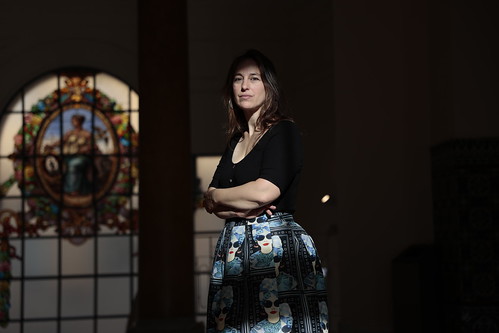The screenwriter Alicia Luna will receive the Comadre de Cine Award at the closing ceremony of the 61st FICX. The Festival is giving her this award in collaboration with La Tertulia Feminista Les Comadres to celebrate not only her achievements in her career, but also her firm commitment to the advancement of women in film and in society as a whole. The honoree notes: «To be given an award by someone you consider very highly is an honour and a responsibility, and I will try to live up to it».

Alejandro Díaz Castaño, Alicia Luna and Begoña Piñero
Her attentive vision of the world, her interest and concern for what surrounds her, make her one of the most original and valued voices in the film world. Writer of films such as Te doy mis ojos and La boda de Rosa, Alicia Luna recognises that she dedicates herself to film because she has a «restless mind and a hyperactive body». For her, the most important thing when approaching the act of creation is the characters: «I concentrate a lot on knowing what they are like, what they feel; on constructing their emotions. There is always something of me in them, even if it is the murderer. You have to love the bad guy so that the audience can empathise with him too, even if he is atrocious. Because if we don’t understand, we distance ourselves and we don’t care. I try not to make my films arbitrary or capricious, I try to create a character and leave him free. My way of working is very introspective, I try to make the characters question me so that I have something to say too, it’s the way to reach the spectator».
In 1999 he wrote his first feature film, Pídele cuentas al rey, directed by José Antonio Quirós. After this, he began his collaboration with the director Icíar Bollaín, with whom he co-scripted Amores que matan (2000); Te doy mis ojos (2004), Goya for Best Screenplay and Best European Screenplay Award; En tierra extraña (2014); and La boda de Rosa (2020), ALMA Award from the Screenwriters’ Guild for Best Comedy Feature Film. He signed other works such as El Refugio (2021), by Macarena Astorga; and Sin ti, no puedo (2022), by Chus Gutiérrez. In 2014 she participated in the film Yo decido: El tren de la libertad, which was filmed by the Colectivo de mujeres cineastas contra la reforma de la ley del aborto and which accompanied the protest initiated in Asturias by the organisation Mujeres por la Igualdad de Barredos and the Tertulia Feminista Les Comadres, a group of people that Alicia Luna admires and whom she defines as «very strong, very important».

Alicia Luna, Comadre de Cine Award
The scriptwriter is also a film teacher, creator of the Madrid Script School and author of training books such as Matad al guionista y acabaréis con el cine, a declaration of intentions from the very title: «The script is ignored, but everyone says that without a script you can’t make a film. Everyone wants to “kill” the scriptwriter, but without a scriptwriter there is no film». She is also a founding member of the Lydia Cacho Foundation, which helps people threatened for fighting human rights violations. She met journalist and activist Lydia Cacho when she was invited to Mexico to write a screenplay about her. She admits to being scared at first and gets emotional when she recalls the phone call to her mother asking her advice on whether or not to go ahead with the project. She told him: «if you stop doing something in life because you’re afraid you’ll always regret it». If the film was not made in the end, it was because, as he admits, they were threatened. Seeing Lydia Cacho’s situation of defencelessness, it occurred to him to create a European foundation in Spain to defend her: «In Mexico many journalists are killed, I found the number chilling, so I set up the Foundation (…) She is one of my mentors in life».
With regard to the place of women in Spanish cinema, although she acknowledges the progress made since the quota, the scriptwriter points out that the average budget for films directed by women is less than half of that granted to their male counterparts. For this reason, she calls for «a bigger budget for women», and asks the big producers to «trust in the new female directors». The screenwriter admits: «I’m always fighting».

























